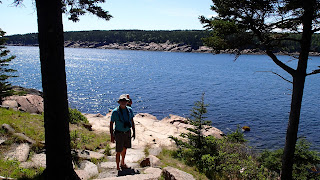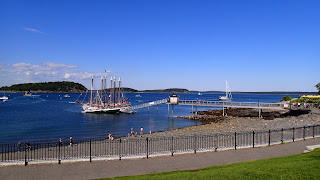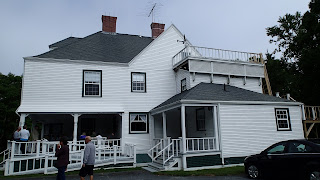We had
reservations for two full weeks at Schoodic Woods Campground in Acadia National
Park located three miles from the town of Winter Harbor. It is approximately 60 minutes from Bar
Harbor and the main section of the park.
The campground, that had its grand opening two years ago, has two
loops. The Loop A sites are geared
towards tents and smaller RV’s offering only electric hookups while Loop B has
large sites with electric and water hookups.
We reserved site B9, a very level long pull through
site. There is only one bathroom per
loop.
The campground is beautiful.
My only complaint is there are no showers.
We have seen lobster rolls advertised since beginning our New
England adventure. Neither Monte nor I
have ever tasted one. We noticed the
price ranged from $8.99 at McDonald’s to as much as $20 in some upscale
restaurants. We decided to try the
lobster roll from this roadside cart located in front of the Fisherman’s Galley
restaurant.
Not knowing if we were going
to like it we bought one ($15) and shared it.
On the afternoon of the 4th we took a bike ride
around the campground loops and in the evening took a drive to Schoodic Point
because we heard we would be able to see fireworks from Bar Harbor.
It was a beautiful evening with spectacular views of
sunset. Unfortunately the mosquitoes chased
us into our truck.
The weather was beautiful the first day we drove over to the
main park at Bar Harbor.
We began at the
Visitor Center located 52 steps up from the parking lot.
In the parking lot there are station stops to
catch shuttles to different sections of the park.
We opted to drive the 27 mile loop in our
truck so we could stop whenever and where ever we wanted.
Our first stop was at Cadillac Mountain.
The line just to get into the parking lot was
very long. We patiently waited for a
spot to open up.
The views were well
worth the wait.
I took over 200 pictures so it became kind of a chore to
select just a few.
This is just one of many short bridges in the park.
Thunder hole is a natural rock inlet where waves crash with a
thunderous boom and high-flying foam when seas are up.
Unfortunately it was low tide we didn’t
witness this phenomenon.
Thunder hole gift shop
The short trail across from the parking lot took us to down
to Otter Point with spectacular views.
The Jordon Pond House is a historic stop that has been
serving tea with popovers and jam since the 1890s. The original building burned down in
1979. The current building built in 1982
continues the summer tradition.
Reservations are required so we passed on trying out the
popovers but we did go through the gift shop.
Monte is on a Tilley Hat kick and can’t resist trying one on at every
store we come across that sells them.
We found a parking spot with a two hour limit right on Main
Street, Bar Harbor.
That was plenty of
time to walk down one side of the street to the harbor and then up the other
side back to our truck.
We stopped in a few shops but I was happy to leave the crowds
and smokers behind as we left the town.
We had originally planned on having dinner in Bar Harbor but
when we saw the prices on menus posted outside restaurants we changed our plans
and ended up at Fuddruckers in the town of Ellsworth. Monte and I shared a bourbon burger with
caramelized onions, crumbled bleu cheese and bacon.
 I didn’t feel too guilty about eating only
half a burger that contains 1,190 calories!
I didn’t feel too guilty about eating only
half a burger that contains 1,190 calories!
We chose one of the best weather days to bike the park
loop.
Monte made a new friend.
This cutie just couldn’t resist taking a dip.
Continuing our ride we came across the area of the park where
volunteer work campers are housed. Monte
chatted with one of the volunteers for a few minutes.
Our next stop was at the Schoodic Education and Research
Center, based at the former Navel Radio Station that had been commissioned in
1935.
The base gradually expanded to
meet the demands of WWII and the Cold War.
By the 1990s the base consisted of more than 35 buildings and 350
personnel.
 The Navy closed the base in 2002 and returned the land to
Acadia National Park for use as a research and education center.
The Navy closed the base in 2002 and returned the land to
Acadia National Park for use as a research and education center.
We stopped a few more times to take pictures (and honestly to
catch my breath) as some sections of the loop are uphill.
During our 80 mile drive to Campobello Island we passed a familiar vehicle. Monte said we need to make a u-turn. It turned out to be our friend Armon’s truck who is workcamping at a nearby State Park.
We chatted for a few minutes and then told him we would stop
by his park after we toured Campobello Island.

Campobello Island is located in the Canadian province of New
Brunswick and is connected to the mainland by the Roosevelt Memorial Bridge at
Lubec, Maine, the easternmost town of the United States.

In preparation for crossing the border I had researched the
procedure, what was acceptable identification and what items are prohibited. It took only 5 minutes to pass customs after
answering where we were traveling from, where we were traveling to, how long we
planned on staying in Canada and if we had any weapons, animals, gifts or
food.
Our main reason for traveling to Campobello Island was to
tour the Roosevelt Campobello International Park. The park preserves the house and surrounding
landscape of the summer retreat of Franklin D. Roosevelt, his wife Eleanor and
their children.
We watched a short film on the history of the Roosevelt’s connection
to the island. In the 1880s wealthy
people flocked to resorts like Newport, Bar Harbor and Campobello. James
and Sara Roosevelt first visited the island in 1883 with their one year old son
Franklin. The house they would
eventually purchase is no longer standing.
The magnificent Roosevelt cottage that is still standing was
a present from Sara to her son Franklin upon his marriage to Eleanor and has
been preserved almost exactly as it was in the 1920s.
The cottage exhibits design principles of the Arts and Crafts
movement and elements of early American Colonial architecture.
The building contains 34 rooms, 18 of which are bedrooms and
6 of which are bathrooms. The cottage
was comfortable, but had neither electricity nor telephone. Kerosene lamps and candles provided
light. Seven fireplaces and kitchen coal
and wood-fired stoves provided heat.
 Running water for bathing, cooking and cleaning came from
storage tanks on the third floor. The
tanks were fed by gravity from tank atop a nearby windmill. Drinking water came in large bottles by horse
and cart from a spring.
Running water for bathing, cooking and cleaning came from
storage tanks on the third floor. The
tanks were fed by gravity from tank atop a nearby windmill. Drinking water came in large bottles by horse
and cart from a spring.
In addition to a governess, during the summer stays at the
cottage, the children were instructed by a live-in tutor.
The Roosevelt family enjoyed summers from 1909 to 1921, when
Franklin contracted polio. Eleanor, the
children, and then grandchildren continued to visit until Eleanor’s death in
1962.
We were able to experience “tea with Eleanor” at the
Wells-Shober Cottage.
Expert guides gave
us a glimpse of Eleanor Roosevelt’s life on Campobello as they served us tea
and homemade ginger snaps.
The linen-clothed tables and fine china recall the style and
ambience of a bygone era.
After tea we toured the Hubbard Cottage, another one of the
few cottages remaining at the park.
 The park contains many trails and picnic areas. We choose to have our lunch a short drive
away at Cranberry Point where we had a great view of the Roosevelt Memorial
Bridge.
The park contains many trails and picnic areas. We choose to have our lunch a short drive
away at Cranberry Point where we had a great view of the Roosevelt Memorial
Bridge.
Before leaving the island, we drove out to Head Harbour
Lightstation, the second oldest lighthouse in the province. The only way to access the island is by foot during
low tide. The lighthouse was built in
1829 as a means of helping ships in the area navigate the famous Bay of Fundy
fog. We decided not to wait another two
hours for low tide.
It only took a few minutes to cross back over the border.
We drove over to Cobscook State Park to visit again with our
friend Armon.
He took us for a tour of the 888 acre park surrounded on
three sides by Cobscook Bay.



































































































Looks like a great area to explore. We may be heading east next June as it's been 7 years. Safe travels!
ReplyDelete